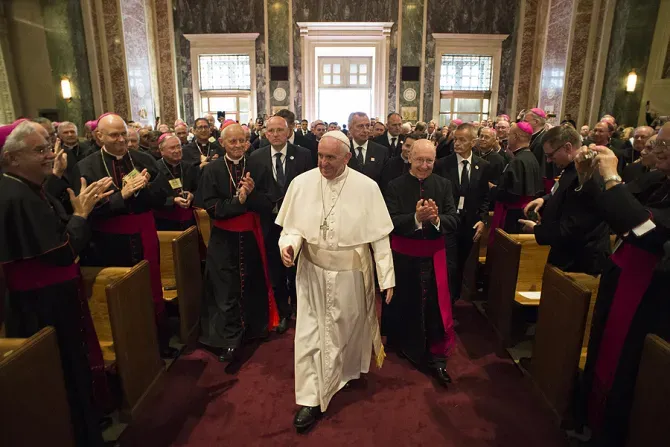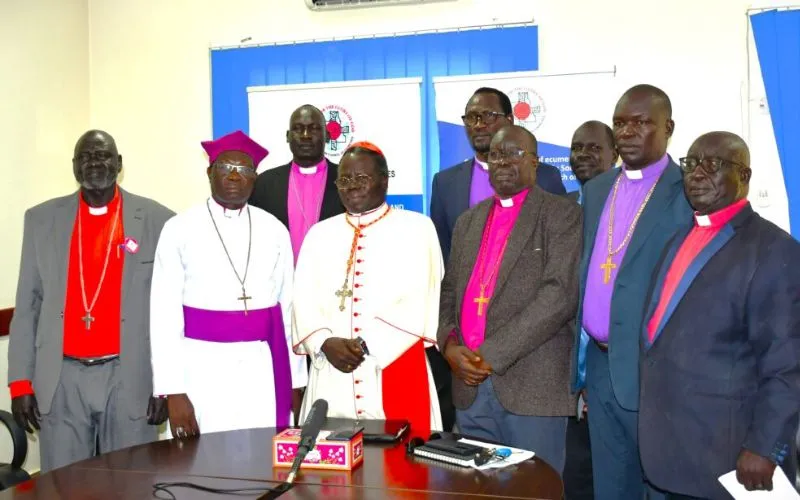“In other words, let this be clear: A bishops’ conference has, ordinarily, to give its opinion on faith and traditions, but above all on diocesan administration and so on,” he said, again emphasizing the sacramental nature of the pastoral relationship of a bishop to his diocese and its people.
“And this cannot be delegated to the bishops’ conference,” he added. “The conference helps to organize meetings, and these are very important; but for a bishop, [being] pastor is most important.”
In the interview, Pope Francis also denounced polarization as “not Catholic,” and said the Catholic way of dealing with sin is “not puritanical” but puts saints and sinners together.
He also said in the U.S., where there is a Catholicism particular to that country, something he called “normal,” “you also have some ideological Catholic groups.”
 Pope Francis arrives at the Basilica of the National Shrine of the Immaculate Conception, Sept. 23, 2015. CNA
Pope Francis arrives at the Basilica of the National Shrine of the Immaculate Conception, Sept. 23, 2015. CNA
(Story continues below)
On the topic of sexual abuse in the Catholic Church, Pope Francis was asked about the apparent lack of transparency when it comes to accusations against bishops, compared with the handling of accusations against priests.
The pope called for “equal transparency” going forward, adding that “if there is less transparency, it is a mistake.”
To a question about Black Catholics, Francis said he is “aware of their suffering, that he loves them very much, and that they should resist and not walk away” from the Catholic Church.
“Racism is an intolerable sin against God,” he added. “The Church, the pastors and laypeople must continue fighting to eradicate it and for a more just world.”
Asked if he has any regrets, or if he would change anything he has done in nearly 10 years as pope, Francis said in English, as he laughed, that he would change “all! All!”
“However, I did what the Holy Spirit was telling me I had to do. And when I did not do it, I made a mistake,” he added.
On his seeming constant joyfulness, the pope said he is not “always like that,” except when he is with people.
“I would not say that I am happy because I am healthy, or because I eat well, or because I sleep well, or because I pray a great deal,” he explained. “I am happy because I feel happy, God makes me happy. I don’t have anything to blame on the Lord, not even when bad things happen to me. Nothing.”
He said the Lord has guided him through both good and difficult moments, “but there is always the assurance that one does not walk alone.”
“One has one’s faults,” he said, “also one’s sins; I go to confession every 15 days — I do not know, that is just how I am.”
Hannah Brockhaus is Catholic News Agency's senior Rome correspondent. She grew up in Omaha, Nebraska, and has a degree in English from Truman State University in Missouri.




 The U.S. bishops met in Baltimore for their annual fall general assembly on Nov. 14-17. Katie Yoder
The U.S. bishops met in Baltimore for their annual fall general assembly on Nov. 14-17. Katie Yoder
 Pope Francis arrives at the Basilica of the National Shrine of the Immaculate Conception, Sept. 23, 2015. CNA
Pope Francis arrives at the Basilica of the National Shrine of the Immaculate Conception, Sept. 23, 2015. CNA


